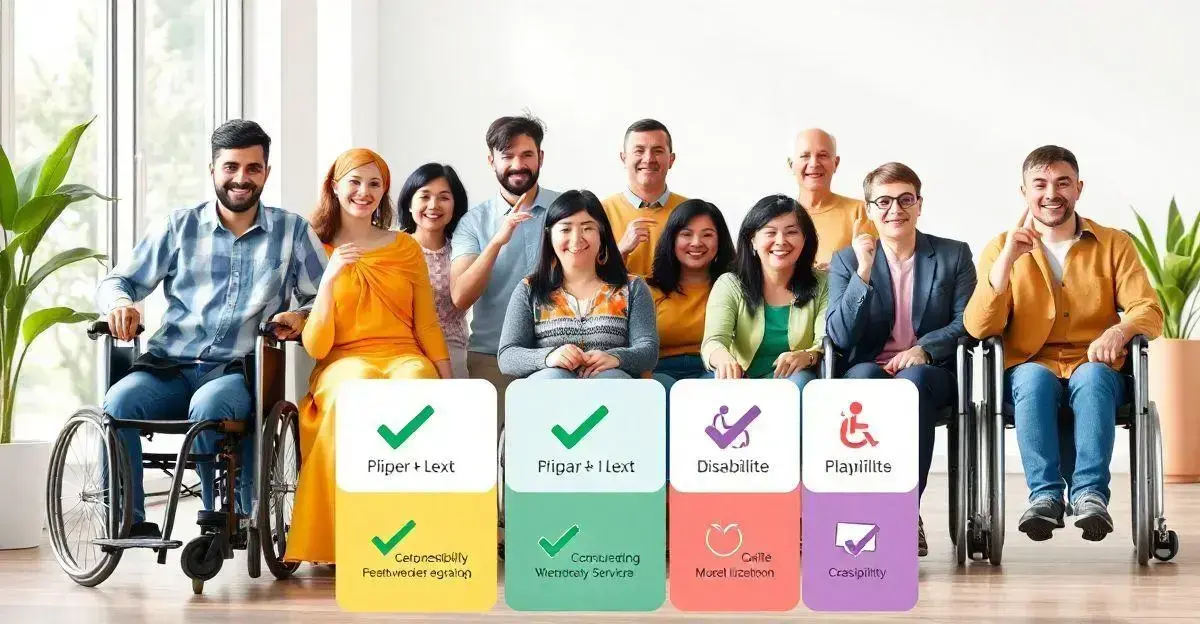Credit card debt forgiveness for disabled individuals can provide crucial relief during tough times. Managing debt while living with a disability can be overwhelming, but there are programs designed to help ease this burden.
By understanding the available options and requirements, you can take steps toward financial freedom. These programs offer a chance to reduce or eliminate debt, giving you the opportunity to rebuild your financial stability.
Ready to learn how to qualify and apply for debt forgiveness? Keep reading to find out more about the process and resources that can help you along the way.
Understanding Credit Card Debt Forgiveness
To begin, it’s essential to understand the various programs available for debt forgiveness. Some organizations specialize in helping disabled individuals navigate their options. These programs may require proof of disability and an explanation of your financial situation.
Furthermore, it’s crucial to recognize that credit card companies may offer their debt forgiveness programs. Contacting your issuer can provide insights into potential relief options. Make sure to document your conversations and confirm any agreements in writing.
Legal protections for disabled individuals also exist. Under federal laws like the Americans with Disabilities Act (ADA) and the Fair Debt Collection Practices Act (FDCPA), debt collectors are prohibited from treating you unfairly because of your disability. Understanding these protections can empower you during negotiations with creditors.
Remember that forgiveness doesn’t typically happen overnight; it’s a process that may take time and effort. However, the relief it provides can be worth the effort, allowing you to focus on your health and well-being.
Eligibility Criteria for Disabled Individuals

To qualify for credit card debt forgiveness, disabled individuals must meet specific eligibility criteria. First, you must provide proof of your disability, which can include medical records or a disability benefits letter. This documentation demonstrates your financial situation and your inability to work.
Next, creditors typically assess your financial hardship. This refers to your income, expenses, and other debts. You may need to provide detailed financial statements to prove that you cannot keep up with current credit card payments.
A crucial factor is also your credit history. Creditors may review your past payment behaviors, as a consistent record of late payments can help your case for credit card debt forgiveness for disabled individuals. Additionally, some programs may be based on income limits, considering what you earn relative to the federal poverty guidelines.
Lastly, it’s important to understand that each lender might have different requirements. Reach out to your credit card company for their specific guidelines on debt forgiveness options. Engaging with a financial advisor could also help clarify your eligibility and assist you in navigating the process effectively.
Steps to Apply for Debt Forgiveness
Applying for credit card debt forgiveness for disabled individuals involves several important steps. First, gather all necessary documentation to prove your financial situation. This includes income statements, bank statements, and any proof of disability.
Next, contact your credit card issuer directly. Explain your circumstances and express your interest in applying for debt forgiveness. Be prepared to discuss your financial hardship and provide any requested documents.
After that, fill out any required forms accurately. Creditors will want to see detailed information about your monthly expenses and income to assess your need for assistance. Make sure to include everything to avoid delays in processing your request.
Follow up with your creditor regularly. After submitting your application, it’s crucial to stay in touch. Ask for updates on your application status and make sure that your documents have been received.
Lastly, consider seeking help from a financial counselor or nonprofit organization. They often have experience navigating these processes and can provide guidance tailored to your situation.
Benefits of Debt Forgiveness
Credit card debt forgiveness for disabled individuals offers significant benefits, particularly for those facing financial challenges. First, it can lead to improved financial stability. When debts are forgiven, it allows individuals to allocate their limited funds to essential living expenses, such as housing and healthcare.
Secondly, forgiveness of credit card debt can enhance mental well-being. Financial stress is a leading cause of anxiety, and removing the burden of debt can relieve some of that pressure. This emotional relief can lead to better health outcomes.
Another benefit is the potential for increased credit scores. If forgiven debts are reported to credit bureaus, it may allow individuals to rebuild their credit over time. A higher credit score can lead to better financing options in the future.
Moreover, debt forgiveness can provide a valuable opportunity for financial education. Through the application process, individuals may gain insights into budgeting and managing their finances better, which is crucial for long-term success.
Lastly, engaging with creditors for forgiveness can open doors to other financial assistance programs that individuals may not have known were available. Overall, understanding the numerous benefits can motivate disabled individuals to seek out debt forgiveness options.
Common Misconceptions about Debt Forgiveness
Many people hold common misconceptions about credit card debt forgiveness for disabled individuals, especially regarding its availability and effects. One prevalent myth is that forgiveness means you won’t owe any money at all. In reality, many programs only reduce the total debt, not eliminate it.
Another misconception is that debt forgiveness is only for low-income individuals. While financial hardship is a criterion, many programs consider various factors, including medical expenses and disability.
Some believe that applying for debt forgiveness will ruin their credit score. However, while there may be a temporary dip, over time, having less debt can actually improve one’s credit rating.
Additionally, many think that creditors will automatically grant forgiveness if you ask. In truth, applicants must provide detailed information about their financial situation and demonstrate genuine need.
Finally, there’s a belief that debt forgiveness is a quick fix. It often requires time and patience, as the process can involve multiple communications and reviews with creditors.
Resources for Disabled Individuals

Consider reaching out to local nonprofits that focus on disability advocacy. These groups often provide financial counseling and can help you explore options for debt forgiveness.
Secondly, the Social Security Administration (SSA) can be a valuable resource. They provide assistance and can guide you through benefits that may free up funds for debt payments.
Additionally, many states have programs specifically designed for disabled individuals facing financial hardships. Check your state’s government website for options related to financial aid and support.
Another excellent resource is the National Federation of the Blind. They offer various programs, including financial help and advice tailored for those with disabilities.
Consider online forums and support groups. Connecting with others in similar situations can provide insights and recommendations for navigating debt and finding helpful resources.
Legal Considerations and Rights
When it comes to legal considerations for disabled individuals seeking credit card debt forgiveness for disabled, there are essential laws to understand.
The Americans with Disabilities Act (ADA) provides protections against discrimination based on disability, ensuring that you have a right to fair treatment in financial matters.
Moreover, the Fair Debt Collection Practices Act (FDCPA) regulates how debt collectors can interact with you. It prohibits abusive, unfair, or deceptive practices when seeking to collect debts. Being aware of these rights can help you stand up against inappropriate collection tactics.
Additionally, you may qualify for special programs and exemptions under bankruptcy law, which can give you significant relief. Many states have their own laws offering protections that can impact your debt situation.
It’s also important to keep documentation of all communications with creditors. This includes emails, letters, and notes from phone calls. Having clear records ensures you can reference these if any disputes arise.
Lastly, consider consulting with a legal professional who specializes in disability law. They can provide advice specific to your situation and help you understand your rights and options.
Conclusion: Taking Control of Your Finances

Taking control of your finances can feel overwhelming, but it is completely achievable with the right methods and practices, especially if you’re considering credit card debt forgiveness for disabled individuals.
Start by assessing your current financial situation, which includes understanding your total income, expenses, and any existing debts. Having a clear picture will help you make informed decisions.
Next, create a budget that outlines your income versus your monthly expenses. This budgeting process allows you to see where your money is going and identify areas where you can cut back. Allocating funds for necessities while also setting aside money for savings is crucial for financial health.
Consider seeking help from financial advisors or using financial management tools available online. These resources can provide personalized strategies for managing your debt, especially if you’re also considering debt forgiveness programs.
It’s also important to maintain open communication with creditors. If you are struggling, proactively reaching out can lead to more favorable terms or even forgiveness options. Many companies prefer to work with you rather than see you fall behind.
Lastly, educate yourself on financial literacy. Understanding how credit works and the various debt relief options can empower you to make better choices, leading to a more stable financial future.
Credit Card Debt Forgiveness for Disabled: Taking Control of Your Finances
It’s important to remember that taking control of your finances is a journey, not a destination. Embracing financial management practices, such as credit card debt forgiveness for disabled individuals, can lead to more peace of mind and security.
Set achievable goals for your financial future, whether it’s reducing debt or increasing savings. Weigh the options available to you for debt forgiveness and make informed choices based on your unique situation.
Knowledge is power, and educating yourself about finance can empower you to make smarter decisions. By actively managing your financial situation and seeking help when needed, you can pave the way to a healthier financial future.
Stay focused, stay informed, and remember you have the resources available to achieve your financial goals.